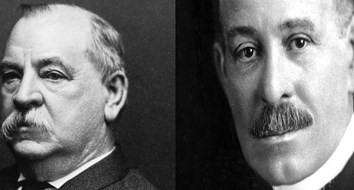Of all the great civilizations of the ancient world, none fascinates me more than that of Rome.
Its Western component survived unconquered for a thousand years, the first half as a republic and the second as an imperial autocracy. From a tiny, nothing-special village on the Tiber to a bustling behemoth numbering 70 million people residing in Inverness to the northwest to Damascus in the east, its path is rich in useful instruction—about human nature, governance, power, economics, morality, and a great deal more.
The Eastern component of Roman civilization, centered in Constantinople (now Istanbul), outlasted the West by yet another thousand years. All things considered, this is not a bad run as far as civilizations go; indeed, it’s one of the longest. We at FEE believe there’s so much to be learned from the Roman experience that we’ve gathered some of the best of numerous articles we’ve published on the subject and put them in one place: www.fee.org/rome.
In his 1944 book, Caesar and Christ, Will Durant summarized one of the monumental lessons of Rome:
“A great civilization is not conquered from without until it has destroyed itself within. The essential causes of Rome’s decline lay in her people, her morals, her class struggle, her failing trade, her bureaucratic despotism, her stifling taxes, her consuming wars.”
All historians of Rome must rely on Roman historians—those who lived in ancient Rome and knew its traditions first-hand.
I’ve learned much about Rome over the years from the writings of popular historians such as Will Durant, Theodore Mommsen, Michael Grant, Anthony Everitt, Mike Duncan, Tom Holland, Barbara Levick, Thomas Madden, and others. They all wrote good stuff within the past century or so. To a considerable extent, however, they and all historians of Rome must rely on Roman historians—those who lived in ancient Rome and knew its traditions first-hand. Some were known and respected in their day and are well worth reading centuries later.
Three of the most notable Roman historians are Sallust, Livy, and Tacitus. In the hope of inspiring present-day readers to learn more about Rome through the writings of these men, I present some of their insights and observations here. Admittedly, the direct quotations were cherry-picked by me for what I regard as each author’s best sentiments and singular wisdom, but they are also representative of their broad perspectives.
Sallust
Gaius Sallustius Crispus, anglicized as Sallust, was both a provincial governor (of Roman North Africa) and a prolific writer during the First Century BC, which was also the last century of the old Republic. The earliest known Roman historian with surviving works to his name, he is best known for his writings about Catiline’s conspiracy to snuff out the Republic and make himself the ruler of Rome. Sallust also wrote extensively about the war against the Numidian king, Jugurtha.
Of Catiline, a demagogic senator whose ill-fated plans were thwarted by Cicero (https://fee.org/articles/enemy-of-the-state-friend-of-liberty/), Sallust wrote this pithy assessment: “Plenty of eloquence, not enough wisdom.” And Catiline was not the only politician ruined by power-seeking. Sallust reported:
Ambition prompted many to become deceitful; to keep one thing concealed in the breast, and another ready on the tongue; to estimate friendships and enmities, not by their worth, but according to interest; and to carry rather a specious countenance than an honest heart.
Sallust sometimes comes under fire for some sketchy self-aggrandizement during his governorship. He may well be culpable in that regard; I don’t know. But either way, his lament about other politicians rings true:
And, indeed, if the intellectual ability of kings and magistrates were exerted to the same degree in peace as in war, human affairs would be more orderly and settled, and you would not see governments shifted from hand to hand, and things universally changed and confused. For dominion is easily secured by those qualities by which it was at first obtained. But when sloth has introduced itself in the place of industry, and covetousness and pride in that of moderation and equity, the condition of a state is altered together with its morals; and thus authority is always transferred from the less to the more deserving.
(The final sentence of that paragraph should remind us of “Why the Worst Get to the Top,” a key chapter in F. A. Hayek’s 1944 classic, The Road to Serfdom.)
Fourteen-hundred years after Sallust lived, Scottish noblemen issued the famous Declaration of Arbroath (in 1320). It made their case against English invaders and implored the Pope to convince the English to leave Scotland alone. Its most memorable line read, “It is not for honor or glory or wealth that we fight, but for freedom alone, which no good man gives up except with his life.” The Scots borrowed it almost verbatim from Sallust, who had written 14 centuries earlier, “But at power or wealth, for the sake of which wars, and all kinds of strife, arise among mankind, we do not aim; we desire only our liberty, which no honorable man relinquishes but with his life.”
I hope this Sallustian assessment of the citizens of his day is not true of those of ours, but in my less optimistic moments I fear it may be: “Only a few prefer liberty; the majority seek nothing more than fair masters.”
Tacitus
A century after Sallust, Gaius Cornelius Tacitus practiced law, served in the Roman Senate, and wrote enough and so well that he is considered one of the greatest historians of antiquity.
Tacitus lamented the demise of the liberties of the old Republic and the rise of emperors of dubious character.
Tacitus lamented the demise of the liberties of the old Republic and the rise of emperors of dubious character. “Lust of absolute power is more burning than all the passions,” he wrote. That truth had played out in the lifetimes of his own parents, who witnessed the horrific crimes of Caligula (https://fee.org/articles/caligula-plumbing-the-depths-of-ancient-tyranny/), Tiberius, and Nero.
This line sounds like it might have come from Ayn Rand’s Atlas Shrugged, but it actually springs from the quill of Tacitus: “When men of talents are punished, authority is strengthened.” The same is true for this one: “And now bills were passed, not only for national objects but for individual cases, and laws were most numerous when the commonwealth was most corrupt.”
In his book titled Agricola (98 AD), Tacitus described the life of his father-in-law, a prominent Roman general who commanded Roman troops in Britannia. The historian cited the Caledonian chieftain Calgacus addressing his warriors about Rome’s thirst for plunder and conquest:
They plunder, they slaughter, and they steal: this they falsely name Empire, and where they make a wasteland, they call it peace.
By this time, Rome had degenerated from a relatively free republic to a monstrous dictatorship, so its policies at home were no better than its policies abroad. As Tacitus noted with regret, “It is the rare fortune of these days that one may think what one likes and say what one thinks.” Note that he uses the adjective “rare” as opposed to, say, “common.”
Livy
Titus Livius, known as Livy in English, lived between the periods of Sallust and Tacitus. He authored a sweeping history of Rome, Ab Urbe Condita, from its founding (753 BC) through the creation of the Republic (508 BC) and on up to the rule of its first Emperor, Augustus (who reigned at the time of the birth of Christ and died in 14 AD).
“The old Romans,” wrote Livy of his countrymen before the Republic, “all wished to have a king over them because they had not yet tasted the sweetness of freedom.” In 508 BC, Romans mounted a truly historic revolution of both ideas and governance. They overthrew the monarchy and established a new order that ultimately included a senate of nobles, popularly-elected Assemblies, the dispersion of centralized power, term limits, a constitution, due process, habeas corpus, and the widest practice of individual liberty the world had yet seen. Before they lost it all less than five centuries later, they experienced a remarkable rise and fall, chronicled by Livy in his Ab Urbe Condita.
From Livy, we learn about Rome’s pivotal wars against the Samnites, the Carthaginians, and other peoples of the Italian Peninsula. He also informs us of the rivalry between Sulla and Marius, the tumultuous last days of the Republic as strong men fought each other for power, the murder of Julius Caesar, and the self-serving machinations of Augustus.
The following are among my favorite insights of Livy. Read them with a sense of “plus ça change, plus c'est la même chose” (the more things change, the more they stay the same):
Men are only too clever at shifting blame from their own shoulders to those of others.
Such is the nature of crowds: either they are humble and servile or arrogant and dominating. They are incapable of making moderate use of freedom, which is the middle course, or of keeping it.
There is nothing that is more often clothed in an attractive garb than a false creed.
And finally, in this passage from the opening of Book I of Livy’s history of Rome, the great historian offers timeless insights into the value of knowing history:
The subjects to which I would ask each of my readers to devote his earnest attention are these-the life and morals of the community; the men and the qualities by which through domestic policy and foreign war dominion was won and extended. Then as the standard of morality gradually lowers, let him follow the decay of the national character, observing how at first it slowly sinks, then slips downward more and more rapidly, and finally begins to plunge into headlong ruin, until he reaches these days, in which we can bear neither our diseases nor their remedies.
There is this exceptionally beneficial and fruitful advantage to be derived from the study of the past, that you see, set in the clear light of historical truth, examples of every possible type. From these you may select for yourself and your country what to imitate, and also what, as being mischievous in its inception and disastrous in its issues, you are to avoid.
Sallust, Tacitus, and Livy prove that great wisdom isn’t all recent. There’s a plethora of it to be found in Roman history and from these particular Romans themselves.





